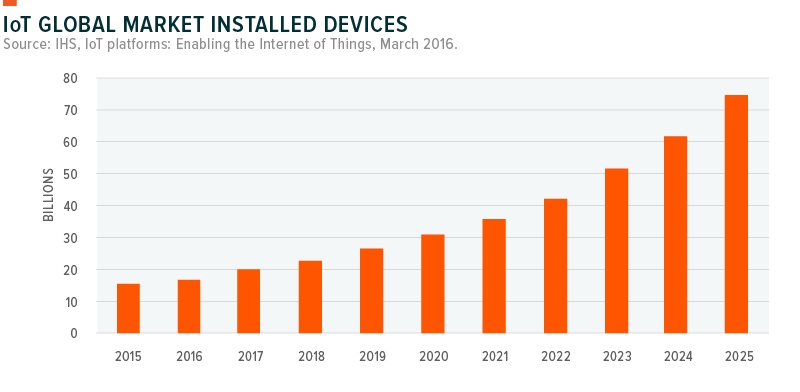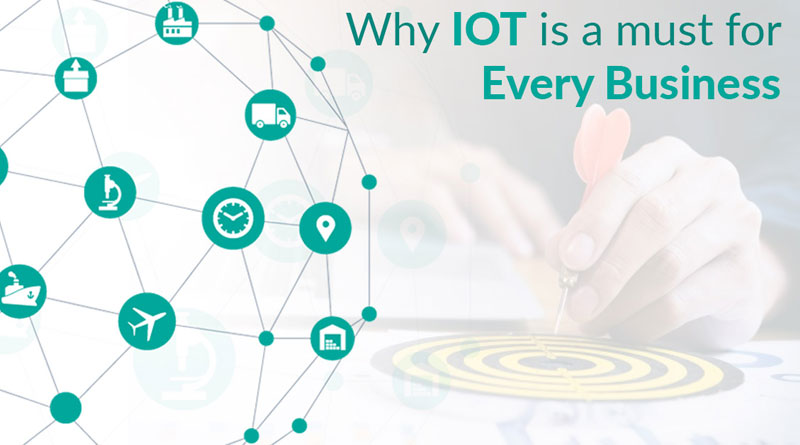What is IoT?
Internet of things is a technology via which, a network of interconnected smart devices can ‘talk’ to each other and can be programmed to do various tasks. Our smart homes are due to IoT technology, which enables IoT devices like smart alarms, intelligent switches, sprinklers, thermostats, and other tools to connect with our smartphones. Roomba is a classic example of IoT in action.
IoT (Internet of things) has opened up a Pandora’s Box of opportunities. IoT is proliferating in every sector, be it healthcare, logistics, manufacturing, construction, or consumer electronics IoT is quickly becoming popular. Using IoT, businesses are now able to gather data regarding their processes which is enabling them to achieve efficiency levels which were not possible previously. By 2025, there will be around 70 billion IoT devices in the world, and we are just starting folks!

A common misconception that small businesses have is that IoT is only for large enterprises. While it is true that like any new technology, the early adopters of this technology will be large enterprises, the smaller companies can also benefit immensely by IoT as the technology becomes more affordable.
Let us have a look at how businesses can use IoT to improve themselves.
IoT can help in providing crucial business insights
IoT devices generate a massive amount of data; this data can be utilized to the benefit of businesses. This data, when combined with big data analytics, can provide valuable insights to the company. The data can be anything ranging from the best possible route for a logistics business to the health of production machines for a factory. This data can be used to improve the business process and hence help in maximizing profits.
Right now, there is an issue of latency (time delay in to and fro data exchange between IoT devices and central servers) because most of the firms rely on cloud servers. This issue will be solved in the near future, as the speed of computing will improve considerably with the onset of technologies like 5G and edge computing. This will positively affect the growth of IoT devices and make the technology more affordable for businesses worldwide.
Help in preventive maintenance and in reducing downtimes
We live in an era where downtime results in not only a loss in production but also the loss of the customer. With increased competition, if you are not able to fulfill your commitments of timely order delivery, there are chances that your customer would turn to your competitor. IoT helps in preventing such a scenario by letting you know exactly when you should schedule your preventive maintenance. The digital twin technology is being used to thwart this problem. In this technology, specific critical components whose failure could stop the entire production line for days are kept in the digital realm. By using data analytics, machine learning, and AI, predictive analysis can be conducted, which helps the engineers in predicting the failure of the component, weeks in advance.
Laing O’ Rourke a premier construction company in Europe is using the digital twin technology to forward plan maintenance of trains three weeks in advance and to reduce the maintenance check time to 19 seconds from 3 hours (manual inspection) previously.
Companies like Chevron are using the digital twin technology in reducing the downtime in their oil refineries and oil equipment. Even countries like Singapore are using digital twin technology.
IoT is innovative
Small businesses can implement smart locks using IoT technology. These smart locks are mostly electronic locking systems which can monitor the movement of visitors in a premise and update the owner accordingly. These locks can be managed remotely, hence providing flexibility to the owner of the premise. In case the employees forget or lose the keys, then the owner can allow for remote access of the proposition using the smart locks.
Amazon is using IoT to automate its warehouses. Such is the level of automation in Amazon’s warehouses that there is minimal human involvement in the management of these warehouses. Small businesses are exploring the idea of smart warehouse management where intelligent IoT devices are connected with the Rfid technology to manage inventory and delivery processes.
IoT is helping the retailers taking the pain out of cloth trial process. Many times, the customers are frustrated in apparel stores when they do not get the color option in the apparel that they have selected. This is a problem with both small and big apparel retailers. The stores are losing valuable customers due to this. A new concept called a digital mirror is gaining traction; here, the customer can see how the apparel looks on him/her. If the color is not according to the customer’s taste, then various color choices can be provided on the digital mirror. The retailer could earn brownie points by offering to deliver the apparel home in case the selected color or pattern is not available currently.
As we can see in this case, the retailer retained and even delighted a customer by providing excellent service. IoT helped in achieving customer satisfaction.
Retailers are using technologies which allow the customers to skip long lines at checkout counters, which we all know is the most frustrating experience in the retail experience. A company called caper is making solutions like the smart cart which is equipped with multiple cameras, weight sensors a barcode scanner and a screen. IoT can help the retailers in optimizing the placement of products, by helping them to determine which products sell the best at which places in the store.
IoT is thus helping brands in connecting with the customer and catering to the customers’ ‘need it now’ demand. Implementing IoT solutions reduces the friction of the shopping experience and thus spurs demand.
Improving productivity and efficiency
Ford is developing the workstations for its employees in Spain by measuring the stress caused in physical movements. How do they do it? By using a bodysuit, it is something similar to the suits worn by Olympic athletes to improve their performance.
By reducing the physical stress, ford ensures that the turnover rate is low in its factory, and workers produce the output in an optimum manner.
Using IoT, a factory can conduct workforce management efficiently. Things like which worker is best for which process and when can be identified by using smart sensors on the machines.
IoT can help in identifying the optimum arrangement of goods and production lines in such a manner that workers have to travel the least number of meters in order to complete their task. IoT can help in saving energy by using smart lighting solutions and turning the machines off if someone forgot to do so.
Conclusion The Internet of Things (IoT) is going to be a significant change agent in all the businesses worldwide. Companies are going to implement IoT with an enhanced vigor, generating valuable real-time data, and utilizing the insights given by IoT technology to improve their business processes. The question to ask here would be not whether IoT is necessary for your company, but whether your company is ready to leverage the power of IoT in its business.
Ashish Parmar is the CEO of Prismetric – one of the reliable Mobile App Development Companies. An enthusiastic entrepreneur, interested to discuss new app ideas, rich gadget tricks and trends, and admires signature tech business styles to readily embrace. He enjoys learning modern app crafting methods, exploring smart technologies and passionate about writing his thoughts too. Inventions related to mobile and software technology inspire Ashish and he likes to inspire the like-minded community through the finesse of his work.


Good stuff that sheds much needed light on mobile app development as creation of an app that enables your business to connect and interact with your customers through the medium of a mobile platform.